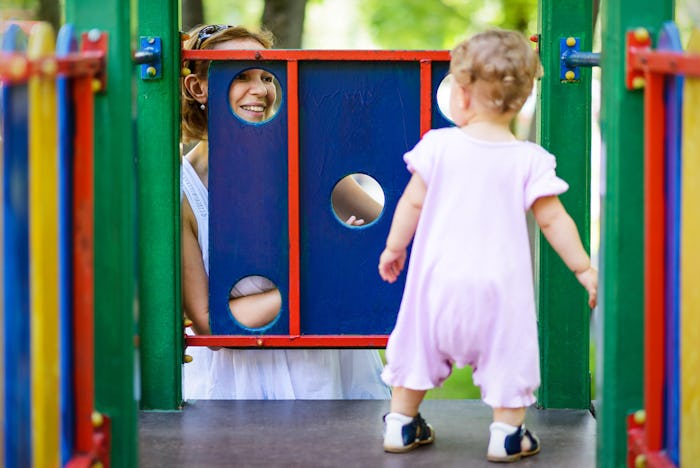Life

How To Get Your Kid To Fit In, Because Playgrounds Are Rough
It's not uncommon for parents to worry about, well, everything when it comes to their children. From what preschool they'll go to, to what college they'll attend, to all the ways their kids could fail to fit in, teaching kids to be social is a part of the parenting job that's tricky, at best. Where is the line between promoting social behavior and forcing your kid to fit into a social role that isn't truly for them? After all, we try to teach our kids to "be yourself." So when is it OK not to fit in? Honestly, how to get your kid to fit in is a complicated question to ask, but it's one worth asking anyway. The job of a parent is never easy, and like anything else we end up deciding for the benefit of our children, all we can do is do research options, tailor expert opinions to fit our unique families, and remember that our children don't need anything more than our best.
With that in mind, Baby Center's Kate Rauch encourages parents to help their school-aged children make friends, especially if they're having trouble figuring out how to do so on their own. Rauch says, "Playing with friends is an important way for young school-age children to learn social rules such as cooperating, not hurting each other's feelings, and waiting their turn. It's also fun." Rauch goes on to say that parents should set up short, structured playdates, and model appropriate social behavior for their kids.
That may help when you're teaching your children how to make friends to begin with. But what happens when they are having trouble keeping friends down the line? What happens when they are the only ones sitting out at the playground? Many parents may try to swoop in and be their child's savior, particularly when their child is obviously hurting. But is that really what's best for your child?
Early childhood interventionist, Patricia Flanagan, a Licensed Clinical Social Worked (LCSW), says perhaps not. Flanagan cautions that helping your child fit in shouldn't be about solving their problems for them. Flanagan goes on to say that the best thing you can do for a child who is having trouble fitting in, or even being bullied, is to show them unconditional love at home, and help increase their self esteem such that they know to limit time with people who don't like them for who they are.
Childhood can be tough. Some of us can even remember our own tough childhood years. PBS Parents, the parenting section of the Corporation for Public Broadcasting, tells parents to teach social problem solving skills rather than solve social problems for your child, saying:
"When children experience social rejection, we often experience it with them. But it doesn’t help when you dwell on it by asking excessive questions, or trying to figure it out for them. Instead of “interviewing for pain,” ask what they’ve done to solve the situation, compliment their efforts, and let your child know you are there. Keep in mind that best friends will get along, fight bitterly, and make up faster than adults. They are simply more flexible and resilient."
So when you're worried about your kid fitting in, model appropriate social behaviors, show unconditional love and support, and talk to your kid to find out if they are being bullied or simply suffering the socially awkward woes of early friendships. No matter what you find, however, it's important you support them.